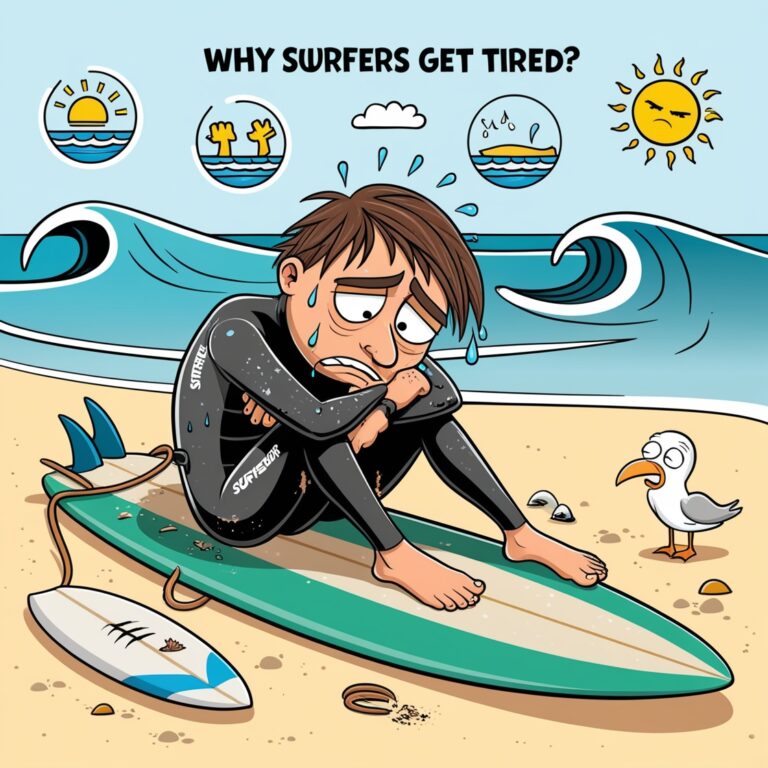Surfing takes a lot of energy. Most people are surprised by how tired they feel after trying surfing for the first time.
Experienced surfers learn simple tricks and tips to manage their effort and sustain a high level of energy while surfing in the ocean.
A common question asked by beginner surfers is, “Why am I so tired after surfing?”
Surfing is an exhausting sport because surfers are pushing their limits while trying to harness their fears. Regardless of experience level, surfers are constantly challenging themselves both physically and mentally in an effort to catch and ride waves.
Surfing is a unique sport because it requires people to participate in an activity that takes place in an unpredictable “arena“, which is better known as the ocean.
1. Surfing Is Scary
At some point in your surfing career, you will realize that surfing is all about survival and managing fear.
Everyday, surfers leave the safety of the beach and paddle out into the ocean. Because the ocean is so unpredictable, you don’t know the challenges you will face until you get out there.
Whether it’s the fear of drowning, the fear of dangerous wildlife or the fear of the unknown, there are lots of things to be scared of in the sport of surfing.
According to Surfer Magazine, the most common fears among surfers are: big waves, wiping out, drowning, sharks, lightning, rip currents and locals.
Put simply, being scared and worrying about the consequences will zap your energy.
Managing fear is a skill that all surfers need to develop.
2. Fight of Flight
Fight or flight is an instinctual stress response that describes how your body is triggered to stay and deal with a threatening situation or to run away to safety. Our instincts help us identify danger and keep out of harm’s way.
As a surfer, we try and catch waves right before they break; this is a potentially dangerous place to be.
When you are paddling for a wave, the fight or flight decision happens right at the moment you feel the wave lifting you up.
There are two options:
- Fight – attempt to pop up to a standing position and risk wiping out
- Flight – pull off the wave and let it pass underneath you
Most often it is safer to pop up to a standing position because you may be setting yourself up for a bigger wipeout.
3. Surfing Vs Breath Control
Many beginner surfers don’t realize how the stress and excitement of catching waves will impact breath control and breathing. Learning to control your breath is an important skill for surfers.
Because surfers are constantly diving under the water, wiping out and holding their breath, many beginners report not being able to “catch their breath”.
This is because surfing requires relatively short periods of intense effort followed by a rest period. Because the ocean is unpredictable and there is always the risk of drowning, surfers can’t predict how long the period of effort will last in comparison to the resting phase.
Learning how to control your breathing will improve your stamina in the ocean, which allows you to spend more time catching waves.
4. Getting Caught Inside: Surfing’s Biggest Battle?
Getting caught inside is when a surfer is in the area between the breaking waves and the beach. Being outside is considered safer because it is beyond where waves are breaking and surfers can sit on their boards and wait for waves.
At beginner friendly surf spots with small waves, getting caught inside isn’t necessarily a problem. Most beginners start out by catching already broken waves, which is also called whitewater. When the conditions are small, it doesn’t take a lot energy to get out of the way of the whitewater.
But at surf spots with larger waves, getting caught inside can be more challenging and you will have to paddle and duck dive your way out of that area.
Check out the video below of surfers getting caught inside.
5. Trying Something New
When you challenge yourself to try new things, it takes courage, patience and a whole lot of energy.
But don’t let that stop you from going surfing for the first time.
I still get butterflies every time I go surfing and the excitement and anticipation can really zap your energy.
Surfing requires lots of preparation because you need to pack your gear, carry surfboards, struggle into a wetsuit and paddle out to the surf break all before you even have a chance to catch a wave.
All that effort doesn’t necessarily guarantee success.
But going surfing and pushing your limits is worth it because you will sleep well knowing you tried something new.
6. Poor Fitting Surfing Wetsuit
Wetsuits are one of the best inventions in surfing and are designed to keep you warm, provide comfort and move with your body.
A wetsuit is like a second skin and ideally you shouldn’t even notice you are wearing one.
If your wetsuit doesn’t fit well it will create a bunch of other issues. Whether it’s too big, too small, too tight or too baggy, struggling with your wetsuit will suck your energy because you will be focused on something other than catching waves.
If your wetsuit is too small it will restrict your movements and tire you out quickly because you will be working against the material. If your wetsuit is too big, it will fill with water and you will be carrying around a considerable amount extra weight.
Wearing a proper fitting wetsuit is very important. Make sure to try on your wetsuit before leaving the surf school or surf shop to make sure you find one that works for you.
If you are looking to learn more about wetsuits, click on the link to be redirected to my post titled, The Complete Beginners Guide to Buying a New Surf Wetsuit.
7. Wiping Out
A wipe out is when a surfer falls off their surfboard while riding a wave. This can be an intense experience because a surfer may get thrown around by the wave and pushed under water.
Common surfing terms used to describe the experience include, rag dolled, pounded, smashed and over the falls.
Check out the Video below to see some wipeouts.
Wiping out is tiring because surfers have to hold their breath, retrieve their board and then paddle away from the breaking waves.
Surfers wipe out all the time so learning how to stay relaxed will save energy and is an important skill to learn.
8. Full Body Workout
Surfing is a full body workout requiring physical strength, flexibility and stamina. People often comment on how exhausted they feel after going surfing for the first time.
Surfing is unique because you can’t turn the ocean off if the conditions are challenging. In many other sports you can stop or slow down if you are out of breath, but in the ocean you may not have a choice.
Returning to the beach is always an option but if you are caught in a rip current or wipeout on a big wave, you may have to expend all your energy to get yourself to safety.
It is important to highlight that surfing is tiring even under normal conditions. Just getting yourself into a position to catch a wave can be exhausting because you will have to paddle out past the breaking waves, this can be the most challenging part of your session.
9. Maintaining Control of Your Surfboard

Maintaining control of your surfboard will take energy because surfers have a responsibility to make sure they don’t hit someone.
As well, surfers need to keep control of their surfboards while paddling, duck diving and catching waves.
Sometimes surfing near a group of beginners can be dangerous because surfboards are flying in every direction, which is the reason why most surf shops and surf schools provide surfboards that are made out of foam.
10. Mental Workout
Surfing is as much of a mental workout as a physical one.
Because the ocean is unpredictable, determining the best spot to surf requires time and effort to analyze different factors like tide charts, wind predictions and swell reports.
You will often notice surfers standing on the beach in an effort to assess wave conditions and crowd size to determine where to paddle out.
Once in the ocean, surfers are constantly calculating and re-calculating a host of different scenarios as they try and position themselves to catch waves.
But too much thinking isn’t always a good thing.
The best tip I have received is to surf with a smile because being happy takes less energy.
Go surfing, have fun, repeat!
For more tips on how to surf, read these articles:
How to Learn Surfing in Your 20s: You’re Never Too Old!


